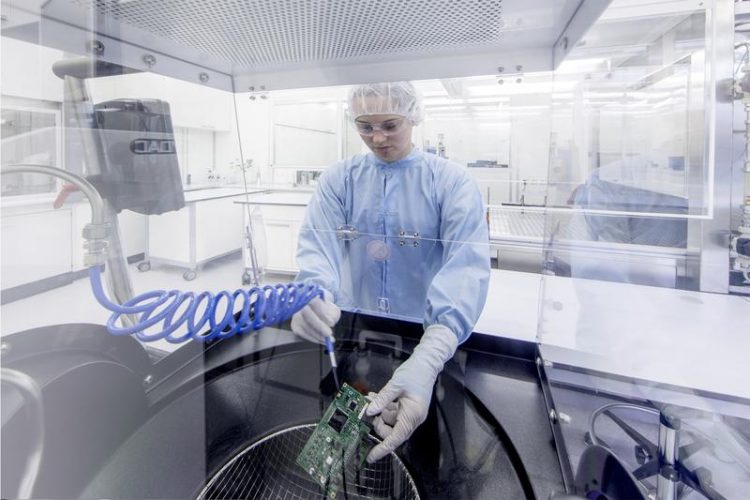International training concept on technical cleanliness inspection

Extracting particles from components following VDA volume 19.1 Source: Fraunhofer IPA
To this end, Fraunhofer IPA has been offering the required training for over ten years now. Given that demand abroad has risen substantially on account of the unabated globalization of automotive industry, English-speaking seminars for trainers will take place. They will be trained as “Technical Cleanliness Tutors”.
VDA 19.1 contains comprehensive guidelines and support outlining how technical cleanliness should be assessed. These cleanliness tests are demanding lab activities which require not only extensive knowledge of equipment and methods, but also necessitate a good deal of finesse.
For this reason, Fraunhofer IPA has been organizing up to five seminars per year centered on the subject of technical cleanliness since the release of VDA 19. Participants will receive a certificate stating that they are a qualified “Technical Cleanliness Inspector” after two training days and successfully passing an exam. These events are often fully booked.
Qualifications are in high demand
As ever more companies involved in the automotive and supplier industries have shifted their production facilities abroad, VDA 19.1 is now also applicable in a rising number of countries outside Germany, with the cleanliness of the relevant components being evaluated. Dr. Markus Rochowicz, Group Manager of Cleanliness Technology at Fraunhofer IPA: “We need skilled staff to confront this development.”
However, it costs both time and money for non-German companies to send their employees to Stuttgart. “It would be better to offer seminars on site at prices typically seen in the respective countries,” explains Dr. Rochowicz.
The VDA has suggested a solution to this issue: “The VDA Quality Management Centre (QMC) engaged us to develop a training concept for Technical Cleanliness Tutors.” Participants from around the world are to be instructed at Fraunhofer IPA’s facilities in Stuttgart, Germany, in order to pass on their knowledge to people in their own countries.
The seminars abroad are based on IPA training courses. Dr. Rochowicz highlights that the only difference is in the practical section: “Participants at IPA in Stuttgart carefully examine real components, whereas tutors abroad will explain the process using images.” Fraunhofer IPA employees have also recorded video clips which can be shown in place of laboratory testing.
Dr. Rochowicz believes that “working through the program with the qualified tutor means that participants can put the processes into practice at a later date.” The inaugural tutor training will take place during the traditional (albeit in English for the first time) training seminars for Technical Cleanliness Inspectors on December 8 and 9, 2015. If you wish to become a tutor, you will be required to attend a further training day on December 10, 2015.
Contact Partner
Dr.-Ing. Markus Rochowicz | Telefon +49 711 970-1175 | markus.rochowicz@ipa.fraunhofer.de | Fraunhofer Institute for Manufacturing Engineering and Automation IPA
Press office
Jörg-Dieter Walz | Telefon +49 711 970-1667 | presse@ipa.fraunhofer.de | Fraunhofer Institute for Manufacturing Engineering and Automation IPA | Nobelstraße 12 | 70569 Stuttgart
Editor
Ramona Hönl | Telefon +49 711 970-1638 | ramona.hoenl@ipa.fraunhofer.de
http://www.ipa.fraunhofer.de
http://www.ipa.fraunhofer.de/schulungskonzept_technische_sauberkeit.html
Media Contact
All latest news from the category: Automotive Engineering
Automotive Engineering highlights issues related to automobile manufacturing – including vehicle parts and accessories – and the environmental impact and safety of automotive products, production facilities and manufacturing processes.
innovations-report offers stimulating reports and articles on a variety of topics ranging from automobile fuel cells, hybrid technologies, energy saving vehicles and carbon particle filters to engine and brake technologies, driving safety and assistance systems.
Newest articles

Bringing bio-inspired robots to life
Nebraska researcher Eric Markvicka gets NSF CAREER Award to pursue manufacture of novel materials for soft robotics and stretchable electronics. Engineers are increasingly eager to develop robots that mimic the…

Bella moths use poison to attract mates
Scientists are closer to finding out how. Pyrrolizidine alkaloids are as bitter and toxic as they are hard to pronounce. They’re produced by several different types of plants and are…

AI tool creates ‘synthetic’ images of cells
…for enhanced microscopy analysis. Observing individual cells through microscopes can reveal a range of important cell biological phenomena that frequently play a role in human diseases, but the process of…





















